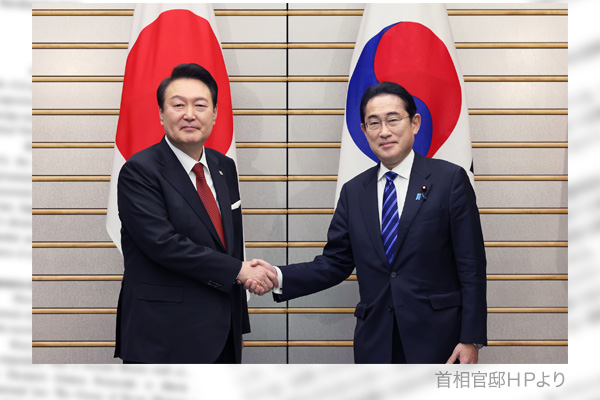When South Korean President Yoon Suk Yeol visited Japan last week, I was in South Korea, where media reported the president as having made a major concession over the issue of wartime Korean workers in Japan and focused attention on whether Japanese Prime Minister Fumio Kishida would offer a clear apology about the issue. Regarding the South Korean government’s decision to have a government-affiliated foundation pay compensation to former Korean workers to solve the issue, leftist opposition groups’ banners questioning why South Korea should pay compensation for what Japan did were seen at various locations. At talks with the South Korean president in Tokyo, Kishida voiced his intention to inherit past Japanese administrations’ historical perceptions and refrained from offering any new apology to South Korea. Kishida’s attitude is commendable.
Particularly, it was commendable for him to say that he would inherit “past historical perceptions,” instead of “past apologies.” This is because historical perceptions, though including a moral apology, cover Japan’s legal position that Japan’s rule of the Korean Peninsula was legal and that the wartime mobilization of workers did not constitute forced recruitment or forced labor.
Agree to disagree
“As we think [the wartime mobilization of workers] did not constitute forced labor under the Forced Labor Convention, it is inappropriate to describe [the wartime mobilization] as forced labor,” Japanese Foreign Minister Yoshimasa Hayashi told the House of Representatives Security Committee on March 9 just before Yoon’s visit to Tokyo. While Japanese media failed to report what Hayashi said, South Korean TV stations repeatedly reported Hayashi’s remark. However, rightist media supporting President Yoon did not condemn the remark as absurd.
Historical perceptions in one country cannot be exactly the same in another country. Countries have no choice but to agree to disagree on historical perceptions. We can say Japan and South Korea did return to the line at their latest summit talks.
However, Japan has to deal with South Korea while anticipating that any agreement with a government may be reversed if a leftist opposition party takes power. “A final national policy maker after the five-year presidential term will be a different person,” said Lee Jae Myung who leads the Democratic Party of Korea, a leftist opposition group that denounced President Yoon’s Japan visit as representing humiliating and unpatriotic diplomacy. Lee thus predicted that his party may turn the tables if it wins back government.
Shelving the radar incident was regrettable
Under ordinary circumstances, even Japan and South Korea should be able to share their perceptions about truths. But they have fallen short of doing so. However, my book about Korean comfort women and workers have been translated and published in South Korea. South Korean scholars, journalists and activists who agree to my claim that comfort women and workers were not forcibly recruited have intensified activities.
On March 15, an anti-Japanese group that erected a comfort woman statue held a rally on a street in front of the Japanese embassy in Seoul, while people who are against the anti-Japan group and demand the removal of the statue met on the same street. Surprisingly, the former rally was attended by some 30 people, while the latter was attended by three times the number of the former, or more than 90, carrying Japanese and South Korean national flags. I delivered a speech at the latter rally, earning big applause.
It was regrettable that the Kishida administration failed to condition the Kishida-Yoon summit on the resolution of an incident in which a South Korean naval ship directed its fire-control radar at a Japanese Maritime Self-Defense Force aircraft in 2018. When I told one of my friends in South Korea that the SDF officers and the defense community were still angered at the incident, the friend said, “If so, Kishida should have told Yoon clearly that bilateral relations cannot be improved unless South Korea admits the radar direction.”
Tsutomu Nishioka is a senior fellow and a Planning Committee member at the Japan Institute for National Fundamentals and a visiting professor at Reitaku University. He covers South and North Koreas.


